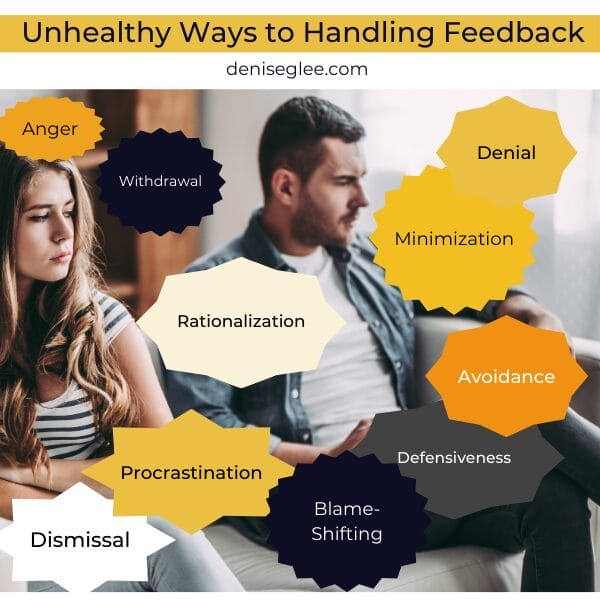
Handling Criticism as a Leader: How to Respond Without Shutting Down
- Updated: April 8, 2025
Are you easily rattled by other people’s comments—especially when they catch you off guard? I’d love to tell you that I’m immune to criticism, but let’s be real: even with years of inner work, some feedback still stings. We’re human, and that means bumping up against people who don’t always communicate clearly—or consider how their words might land.
As a healing and leadership coach, I’ve learned that thriving in leadership isn’t about avoiding criticism—it’s about developing the emotional maturity to handle criticism as a leader with grace, clarity, and confidence. This article isn’t about decoding everyone else’s behavior. It’s about strengthening your emotional core so you can respond—not react—when things get uncomfortable. Whether you’re leading a team or running your own business, this is where real leadership begins.
But haven't you written about handling comments or criticism before, Denise?
The short answer is yes, I have.
In my article “Embracing Constructive Criticism,” I talk about my own experience with getting feedback and why it’s important for getting better. I believe it’s important to appreciate feedback and see it as a chance to improve.
On the other hand, in “Use Negative Comments & Criticism to Help You Grow Emotionally,” I talk about why it’s tough for us to handle criticism and offer ways to handle it better. Here, I encourage readers to confront their past hurts and use criticism as a chance to become better versions of themselves.
This article is different, as we will focus on the reasons why we struggle with receiving comments from others and how to improve our emotional intelligence. This is important because you cannot handle criticism as a leader until you learn how to keep your own emotions in check. First, let’s define emotional maturity.
What is Emotional Maturity?

You might be wondering, “Okay, Denise—what exactly is emotional maturity, and what does it have to do with handling criticism?”
Great question.
Emotional maturity is the ability to stay grounded in who you are, even when the situation around you feels shaky. It means you can hear tough feedback without spiraling into shame or lashing out in defense. It’s about managing your emotions, owning your reactions, and recognizing when you’re being triggered—so you can lead with clarity, not ego.
It’s not about being perfect or never feeling hurt. It’s about learning how to pause, reflect, and respond intentionally instead of reacting impulsively. And yes, that takes practice.
When we dodge feedback or shut down emotionally, we miss some of our biggest opportunities for growth—not just in business, but in life. That’s why in this article, we’re digging into the real cost of avoiding uncomfortable truths… and how you can grow into the kind of leader who can handle criticism without breaking down.
We’ll start by looking at what emotional immaturity can look like in our personal life, then move into what it looks like in our professional world.
When there is nobody else in their world who feels brave enough to say anything, not only do you limit your company, but you also limit your ability to think objectively.
Denise G. Lee Tweet
How Emotional Immaturity Shows Up in Everyday Life
Let’s be honest—none of us love being called out, even when it’s well-meaning. But how we respond to that discomfort says a lot about our emotional maturity. And when we’re not grounded, we tend to default to old patterns—deflection, defensiveness, denial.
To keep this light but real, I created some fictional stories to show how emotional immaturity can sneak into our personal lives. Each example reflects a different emotional avoidance style—and the hidden cost of staying stuck in that pattern.
As you read through these, ask yourself gently: Have I ever responded this way, even if just for a moment? No judgment—just awareness. That’s how maturity starts.

Denial
Situation: Sarah finds it hard to believe or accept feedback from her spouse about her spending habits. Even though her spouse tells her many times about their tight budget and how her spending affects it, Sarah won’t admit that she spends too much. This disagreement causes arguments between them and puts pressure on their relationship and money situation.

Avoidance
Situation: Tom’s friends get concerned about how much he drinks when they’re together. They try to talk to him about it, telling him they’re worried about his health and happiness. But instead of dealing with it, Tom avoids the topic completely. He keeps on drinking a lot, not listening to his friends’ advice, which could harm his health and friendships.
Why Denial and Avoidance Hurt Everyone
Sarah’s husband and Tom’s friends both want to help, but they can’t because Sarah and Tom don’t want to deal with the issue. As a result, they are both being harmed not only financially (drinking in pubs and restaurants isn’t cheap), but they are also risking the relationships that matter most to them.
To make matters worse, there is nobody else in their world who feels brave enough to say anything because these two don’t want to confront their own issues, which limits their ability to think objectively.
Now, let’s see another set of examples of how inability to receive feedback hurts us in the business world.
What Emotional Immaturity Looks Like at Work
You might be a phenomenal leader with high standards and a clear mission—but if emotional maturity is missing, even the most talented professionals can derail trust, productivity, and morale.
This next section highlights how emotional immaturity can show up in professional settings. We’ll walk through two common but damaging responses: defensiveness and rationalization—and the ripple effects they create inside your team or business.
If you’ve ever caught yourself pushing back, shutting down, or spinning a story just to feel safe—this part’s for you.

Defensiveness
Situation: Mark is a manager at a company. His team tells him that he checks their work too much, which makes them feel stressed and less motivated.
Instead of listening to what they say, Mark gets defensive. He tells them they don’t know how busy he is or how important it is to do things perfectly. Because of this, his team feels like he doesn’t appreciate them, and they’re not as happy, which affects their work.

Rationalization
Situation: Lisa runs an e-commerce business. Some of her customers tell her that they are unhappy with the quality of her products. Instead of accepting the feedback, Lisa makes excuses.
She says that her products are good enough and blames other things like shipping delays or the customers not understanding how to use the products properly. But because she doesn’t take their feedback seriously, her customers start to lose trust in her brand, and her sales drop.
Why Denial and Avoidance Hurt Everyone
As business owners, it’s important for us to delegate tasks and be open to feedback so we don’t end up in unnecessary problems. But if we try to please everyone too much, nothing gets done.
In the example with Lisa and Mark, both of these leaders are ignoring the fact that their team members are less productive and less happy because they’re defensive and making excuses.
As a coach, my job is to help you, the leader, recognize when you’re going from being focused on the mission to being careless and risky.
Didn’t see anything that relates to you? That’s okay. Next, I’ll share some other ways we might avoid feedback.
It HURTS to hear not-so-positive comments, especially those that do not make us feel beautiful, sexy, and wonderful 24/7. However, when we only block out the bad, we ultimately make things worse for ourselves in the long term.
Denise G. Lee Tweet
How We Screw Up Handling Criticism as a Leader
We’ve already explored defensiveness, denial, avoidance, and rationalization—but avoiding criticism as a leader has many faces. When we don’t feel safe, secure, or grounded in ourselves, we often fall back on protective habits that quietly poison our relationships and stifle our personal growth.
Here are some of the most common emotionally immature responses to feedback:
Denial – Refusing to acknowledge or accept that there’s a real issue.
Avoidance – Evading the conversation altogether or changing the subject.
Defensiveness – Immediately justifying or pushing back when challenged.
Rationalization – Spinning logical-sounding excuses to dodge discomfort.
Minimization – Downplaying the feedback as “not a big deal.”
Blame-Shifting – Pointing fingers at others instead of taking responsibility.
Anger – Reacting with irritation, sarcasm, or even hostility.
Withdrawal – Emotionally checking out or going silent to escape the moment.
Procrastination – Delaying action or response in hopes the issue fades.
Dismissal – Writing the feedback off without any real consideration.
These reactions are often symptoms of cognitive dissonance—when our inner beliefs and the reality we’re being shown don’t match. Instead of sitting with the discomfort, we shut down, lash out, or spin stories to protect our egos.
But emotional maturity asks something different. It invites us to slow down, get curious, and ask:
“Is this response helping me grow?”
Because once we shift from ego-protection to inner safety, we unlock our capacity to receive truth—and use it as fuel for transformation.
In the next section, we’ll explore how to handle criticism as a leader and embrace feedback with grace, curiosity, and self-respect.

How Emotionally Mature Leaders Handle Criticism
Emotional maturity isn’t about pretending nothing bothers you—it’s about responding with intention instead of reaction. When someone offers you constructive feedback, it can sting. But maturity means using that moment to grow, not shrink.
Here’s how emotionally mature leaders embrace feedback without falling apart:

1. Listen Without Defending
Immature response: “That’s not true!”
Mature response: “Tell me more.”
Example: You run a small marketing agency. A team member mentions that clients want fresher ideas. Instead of jumping in to justify your current strategy, you breathe and really listen. You take in what’s being said—not what your ego wants to hear.
2. Regulate Before You Respond
Immature response: “I work hard and this is the thanks I get?”
Mature response: “I appreciate you sharing this. Let me think it over.”
Example: As a restaurant manager, a customer gives tough feedback on a new dish. Your gut wants to roll your eyes—but instead, you stay calm and say thank you. Emotional maturity allows space between your trigger and your response.
3. Ask Curious, Non-Defensive Questions
Immature response: “Well, what do you expect me to do about that?”
Mature response: “Can you help me understand what would have made that better for you?”
Example: You’re a startup founder. A user reports a bug. Rather than assuming it’s minor, you ask detailed, open-ended questions to fully understand the issue. Your curiosity becomes a strength.
4. Reflect Without Shame
Immature response: “I’m the worst. I knew I’d mess that up.”
Mature response: “What’s here for me to learn?”
Example: You’re leading a team and someone says your emails are confusing. Instead of spiraling into self-doubt, you take a breath, think about past messages, and ask, “How can I be clearer next time?”
5. Take Action With Integrity
Immature response: “I’ll change just to make them happy.”
Mature response: “This feedback aligns with the kind of leader I want to be.”
Example: Your staff tells you the retail floor plan creates traffic jams. After truly hearing them and reflecting, you make adjustments—not from fear, but from a desire to serve better. That’s what maturity looks like in motion.
Embracing feedback doesn’t mean you agree with everything. It means you’re willing to grow, not guard. That’s the heart of emotional maturity. I hope these tips help. Next, I will share my final thoughts.
Final thoughts
When our thoughts are tangled and our emotions feel too loud, it’s easy to slip into reactions that hurt more than they help. But emotional maturity isn’t about perfection—it’s about pausing, reflecting, and asking, “Is this helping me grow, or keeping me stuck?”
Just that one moment of awareness can shift everything. Did you have a story about your journey towards emotional maturity? I would love to hear it! Write to me using tis link.
If you’re navigating hard emotions, strained relationships, or uncertainty in your leadership, you’re not alone. Handling criticism as a leader is something we practice, not something we magically wake up with. And it starts with telling the truth—to yourself, and then to someone safe.
🟡 Want support? Let’s talk: Schedule a time here.
Also, I invite you to explore this topic further by listening to the related episode on my podcast. Let’s grow through it together—because your peace and power are worth the work.





